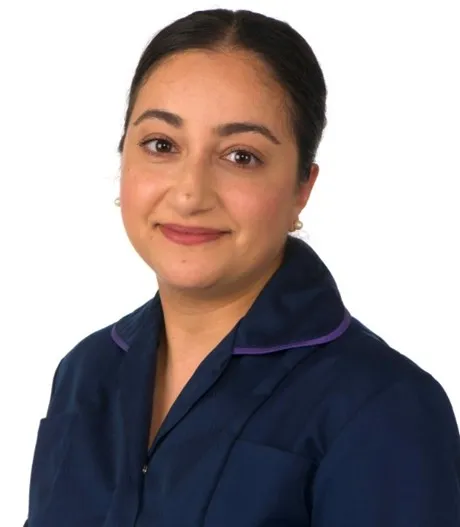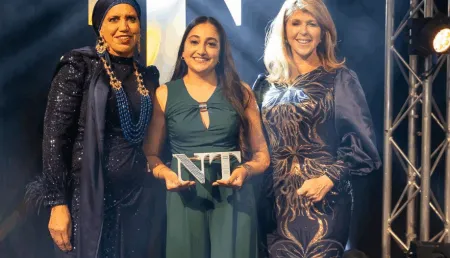
By Dalvir Kandola, Consultant Midwife - Lead for Inclusivity at University Hospitals of Leicester (UHL) NHS Trust
As a Consultant Midwife, research is a key pillar of my role. In 2024, I completed the inaugural ‘Into Research’ programme, supporting Black and Brown nurses and midwives to get into research.
My research focus centres on addressing health inequalities in maternity services. In recognition of my contributions to midwifery, I was honoured with the Royal College of Midwives (RCM) Fellowship in 2025.
I have taken a leadership role in a workstream aimed at improving the culture and communication of research as part of the Institute of Excellence in Healthcare at UHL NHS Trust.
I also contributed to the RCM Research Strategy 2025-2027 and I won Midwife of the Year 2025 for my efforts in addressing health inequalities in maternity care and for my transformational leadership.
Motivation to apply
As a midwife with over 15 years of experience, I aspired to contribute to research but found limited opportunities within my field.
Midwifery is underrepresented in research, and without visible role models, it can feel daunting to step into this space.
The NIHR ARC East Midlands pre-application support fund offered me the chance to carve out time, build confidence, and begin shaping a competitive doctoral application.
Before applying, I found the research process confusing, difficult to navigate and isolating. Despite reading extensively and attending webinars, translating knowledge into practice was difficult.
The funding provided mentorship, networks and structured guidance that helped me overcome these barriers.
Support received
I worked closely with Emma Rowley, Research Capacity Development Lead, whose one to one meetings helped me navigate the complexities of research.
She connected me with experts across the region who were able to review my application and provide feedback and offered valuable advice.
Emma also acted as a ‘phone a friend’, guiding me through systems such as how to get support with a SoECAT and sharing practical tips when things got a little much.
The Research Support Service also provided regular dialogue and a critical lens on my work. Their feedback sharpened my application and gave me confidence in its quality. Their support has been invaluable.
Creating space to focus
One of the most transformative aspects of the fund was the ability to dedicate specific days each week to my application.
This focus time allowed me to step away from my day job responsibilities and immerse myself in research planning. Without this headspace, I could not have developed my proposal to the same standard.
Building a strong knowledge base
Alongside application support, I invested in training to strengthen my research foundations which included:
- University of Oxford publication skills course – helped me understand the lifecycle of research write up, copyright contracts and strategies for dissemination
- University College London course on behavioural change interventions – provided background on the theoretical underpinning for my doctoral proposal
- Centre for Ethnic Health Research courses – cultural competency and community engagement training, which enabled me to translate clinical knowledge into research contexts
- JBI scoping review training – equipped me with the skills to conduct a scoping review to inform my doctoral background
Expanding skills and networks
The journey also supported my professional growth:
- I updated my ORCID profile which is used to share research outputs and is assessed as part of the doctoral application
- I submitted abstracts to conferences, including:
- Baby Lifeline National Maternity Safety Conference – I was successful in a poster presentation on supporting asylum seekers with culturally sensitive public health information
- Asian Professional National Alliance Conference – I presented a QI project within their research stream
- NIHR Academy Members Conference – my poster was my doctoral proposal, highlighting methodology and potential impact
- I published my rapid review findings in the Midwifery Journal MIDIRS
- I prepared and submitted my scoping review proposal to the Open Science Framework
These outputs not only expanded my research profile but also the successful acceptance of abstracts, presentations, and publications provided external validation of my work and gave me confidence in my ability to contribute meaningfully to the research community.
Reflections and advice
The difference this fund made to my journey has been immense. It gave me the headspace to focus, the knowledge to strengthen my proposal, and the networks to grow as a researcher.
I am deeply grateful to Danni Burnett, Director of Midwifery at UHL NHS Trust, for supporting my application, and to Professor Debi Bhattacharya at the University of East Anglia for her patience and guidance as my primary supervisor.
For others considering research, I strongly recommend applying for pre-application support funds. Whether you are preparing for a PhD or a Master’s, this support can help you identify gaps, build skills, and put together a strong application.
To follow my research journey and stay updated on my doctoral application progress, connect with me on LinkedIn here:
https://www.linkedin.com/in/dalvir-kandola-15b4b2299

